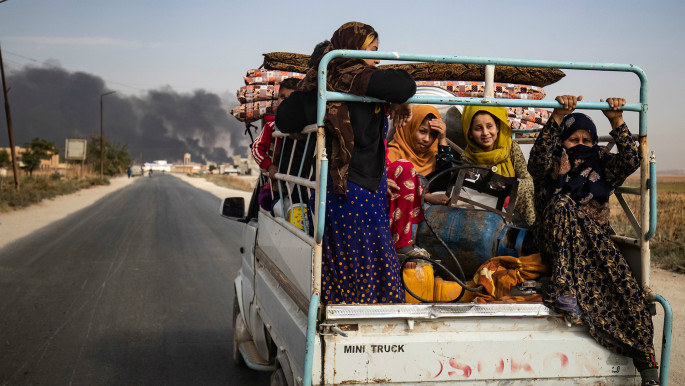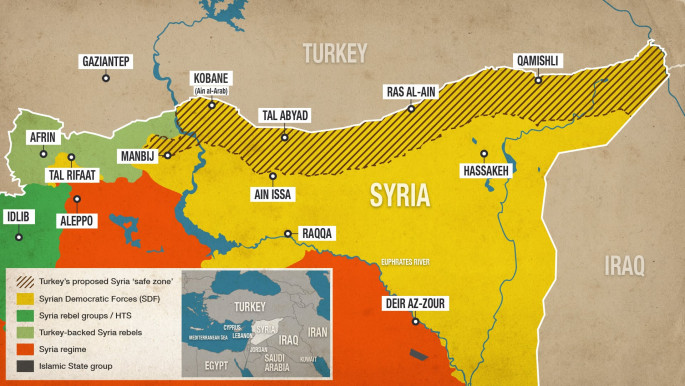What is next after Operation Peace Spring?
The Turkish military "Operation Peace Spring" aimed to achieve two goals – to establish a "safe zone" where it could resettle mostly Arab Syrian refugees who have fled to Turkey and to push the Kurdish People's Protection Unit, or YPG, who Turkey regards as terrorists, out of the area.
YPG, considered as a branch of the Kurdistan Workers Party [PKK] fighting for Kurdish political and cultural rights, has been a thorn in Ankara's eye since the start of the Syrian conflict and has been perceived as a huge threat to Turkey's
border security.
Turkey redraws the map of north-east Syria
From the Turkish perspective, settling Arab refugees along the Turkish-Syrian border would solve both issues, as Ankara would get rid of the refugees, who would then be used as a shield against the Kurdish elements.
Turkish President Recep Tayyip Erdogan unveiled some of this ambition at the 74th session of the United Nations General Assembly in September 2019 when he presented a controversial plan to settle two million displaced Syrians in a 30 kilometre wide safe zone.
Despite receiving some $6 billion in aid from the EU, the refugees have become an ever-greater burden on Turkey as it battles economic recession and high unemployment.
But Turkish goals have caused much concern within the international community as continued reports of atrocities by Turkish-backed forces and human right violations raised the fears about ethnic cleansing.
 |
|
| Read also: Syrian Sufis fear extremists fighting alongside Turkish army |
While Turks have tried to present its actions in north Syria as an anti-terrorist operation, claiming that they are bringing life back to northern Syria by "voluntarily" moving Syrians from Turkey to the "safe zone", many, including Kurds, fear that resettlement aims to change the ethnic structure of northern Syria and that pushing Kurds further south is nothing but a classic example of ethnic cleansing.
According to Kristel Cuvelier, a staff member of the Brussels based Kurdish Institute, "Turkey's operations haven't really ended, they have just moved to lower intensity warfare through proxies."
She accused Turkish-backed proxies of being "highly undemocratic and fanatic" while "applying tactics and ideas very similar to those of the Islamic State group [IS]." She also added that "atrocities and human rights violations against the population of northern Syria, especially the Kurds and other communities like Christians, continue."
For her, the autumn operation is "an illegal Turkish occupation of Syrian territory that goes against international law" adding that "the Turkish occupation must end."
The unclear fate of the Kurdish units
The Kurds, abandoned by their former allies, therefore, had no other option but to strike a deal with Syria's President Bashar al-Assad whose forces are taking over border security from the YPG.
According to the ceasefire agreement, some 80 percent of the border will be under the control of forces backed by Assad. The latest Turkish incursion looks like a gift to Assad, who could potentially get a big chunk of Syria into his control.
But it is unclear whether this process will go smoothly and peacefully. According to David Romano, an expert on Middle East Politics, Assad's troops will most likely take over the exclusive authority of some areas right on the border. "This will avoid giving Turkey an excuse to invade more areas, since the YPG will not be right there on the border," he told The New Arab. However, he warns that Assad's forces and the YPG operating side by side are also a more difficult and sensitive matter that may lead to accidents – although it has happened on occasion in places like Qamishli and Deir al-Zour.
 |
|
| Read also: Turkey, the Kurds and the demographic re-engineering of Syria |
The future status of YPG's 70,000 members is also unclear – will they will be incorporated into the Syrian regime army, or remain an autonomous force or will they will be demobilised?
Melinda Negrόn-Gonzales Associate Professor at University of New Hampshire believes that their fate is tied to the fate of the broader Syrian Democratic Forces [SDF] and for now, at least, it seems to be a package deal.
Russia has called on Assad and the SDF to communicate and come to an agreement that would lead to the integration of the SDF into the ranks of the regime forces.
According to Romano, Assad wants them to simply be absorbed into the Syrian army, while they wish to maintain a distinct operating force under their own commanders – similar to the Peshmerga in Iraq Kurdistan. But as neither side trusts the other, he said that this is really a one million dollar question.
Negrόn-Gonzales reminds that last month, the leader of the SDF, Mazloum Kobani set two conditions for an agreement with Assad – specifically that the SDF would remain a distinct unit within the broader Syrian armed forces and the current Kurdish administration in north-eastern Syria would also remain intact and become a part of the Syrian administration.
So again, "We see that the SDF, YPG and PYD-led Autonomous Administration of North and East Syria are considered a package deal," she added.
 |
|
YPG's fate lies in the hands of Russia
But much will depend on Russia's future plans for the conflict solution in Syria. So far, Russia has not established military ties with the YPG, in order to maintain close ties with Ankara, but sooner or later Moscow will have to take a stance over the Kurdish issue if it wants full control over the situation in Syria.
According to Romano, Russia does not appear to be dead set against some form of federalism or autonomy for certain parts of Syria. "Their interests revolve around keeping their ally Assad in power, maintaining their facilities in Syria (particularly the naval base in Tartus) and blocking the United States from controlling Syria," he continued.
For Romano, it is, therefore, possible that Russia establishes more military ties with the YPG – there were moments a few years ago where it even appeared that the YPG was able to request Russian airstrikes against IS in particular locations.
The Assad regime, however, does not want any decentralisation of its power and according to Romano, "Assad will ask the Russians not to accept or promote such a thing."
As for Negrόn-Gonzales, Turkey will continue to insist on the disarmament of the YPG. Ultimately, "the YPG's fate lies in the hands of the Russians and their ability to broker an agreement between the regime and the SDF on the integration of the SDF into regime forces."
But if Mazloum Kobani has his way, she added, "the SDF would remain largely intact even as it is included in Syria's armed forces."
Kurdish political unity remains
Current pressure on the Kurds in Syria poses a challenge to their political unity as some raise the possibility of internal struggles within the YPG and between the YPG and the PKK.
But according to experts, this possibility is just media speculation which does not reflect the reality on the ground. Romano is convinced that the YPG will never become a rival to the PKK as the two groups are bedfellows since the beginning, with many ex-PKK fighters (especially those of Syrian Kurdish origin, which accounted for up to 25 percent of PKK ranks) now playing prominent roles in the YPG.
"The YPG, despite all the talk of democratic autonomy, appears to be a very strict, uniform and disciplined organisation that does not allow much in the way of political pluralism within its ranks (although they could be described as the most liberal in the area when it comes to religious and ethnic pluralism)," he added. And even if the YPG were to officially sever institutional ties to the PKK, say, as part of a deal with Assad, Negron-Gonzales is convinced that informal ties and relationships between personnel would likely continue.
So, according to her, it seems unlikely that the YPG would become an outright rival to the PKK though it is certainly in the interest of the YPG, and the PYD, to chart a course of their own in Syria.
Stasa Salacanin is a freelance journalist who has written extensively on Middle Eastern affairs, trade and political relations, Syria and Yemen, terrorism and defence





 Follow the Middle East's top stories in English at The New Arab on Google News
Follow the Middle East's top stories in English at The New Arab on Google News


